'As a player, the biggest question you ask yourself is whether you are good enough to be on the same ground as Gavaskar, Dev, Border and company.'
This interview was first published on Rediff.com on March 22, 1999. It is being republished in remembrance of Dean Jones, a fine cricketer and a cricket guru who sadly passed into the ages in Mumbai on September 24.
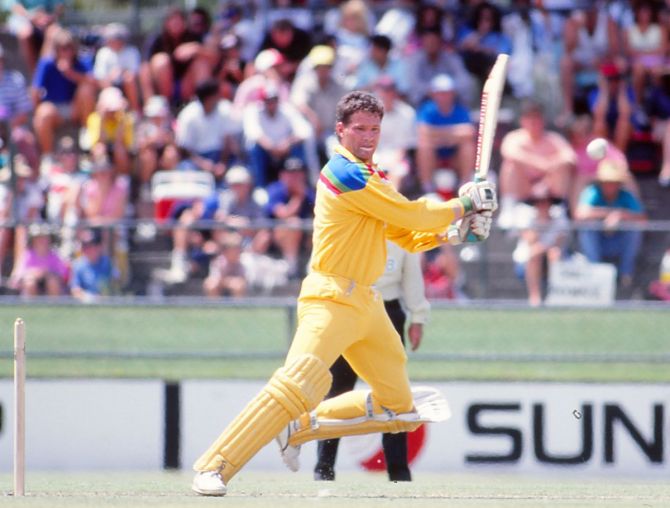
Tough, assertive, confident and the hell of a cricketer -- those are adjectives his friends would use to describe Dean Mervyn Jones. His enemies, and their number is legion, use other words which we won't go into here.
From his first entry onto the world stage as a cocky brat, to his maturity as the pivot of the Australian batting side and captain of Victoria, Jones has always been in the limelight.
Superb driving on both sides of the wicket, fierce hooking and above all, electric running between wickets have been trademarks of 'Deano', as he is known through the cricketing world.
For the Indian fan, it was 1987 that brought the brash Aussie to public notice -- the famous Madras Test of that year, only the second instance of a Tied Test, saw the Victorian make a magnificient 210 in conditions of debilitating heat.
None who had the good fortune to see that Test will ever think of it without recalling images of Deano's knock. The shots that, towards the end of his effort, were a triumph of mind over matter.
The constant pauses to throw up beside the pitch. The anxiety that enveloped the stadium, as Jones stumbled, after his marathon, into the dressing room, to be rushed to hospital for treatment while, in his absence, the two teams battled on to a famous tie...
Ironically, though this innings -- and others like his 216 against the Windies in 1988, or his Ashes series of 1989 when he topped the tour aggregates and averaged a phenomenal 88 -- established him as a top-class Test cricketer, the selectors viewed him as exclusively one day material. He was dropped for the 1993 tour of England, then recalled for the one day home series against South Africa, then dropped for Australia's own tour of that country...
How much of his 'now in, now out' presence in the Australian team owed to his cricket, and how much to an iconoclastic attitude that once saw him lead a team out, for a first class fixture, in short trousers will be never known.
As ebullient with words as he was with the bat (Aussies refer to him, only partly in jest, as 'the mouth from the south'), Dean Jones readily sat down to respond, via e-mail, to questions from Prem Panicker.
The Australian mindset today seems to be, catch them young and blood them quick. You were hailed as a child prodigy in your time, so tell us what it takes to break into the big time while still young?
To break into the big time when you are young, there must be a few requirements.
Obviously you have to be able to play, but the major necessity is opportunity.
Australians don't mind giving a kid a chance -- like Ian Craig, who was 17 years old and became our youngest captain.
The Australians like to support the underdog or youngster at any given chance.
Youth will always provide enthusiasm and excitement, as well as keep the older players honest and on edge.
To get an opportunity is one thing, though, and taking advantage of it is another.
Youth tends to show no fear -- an advantage yes, but it can also be their weakness.
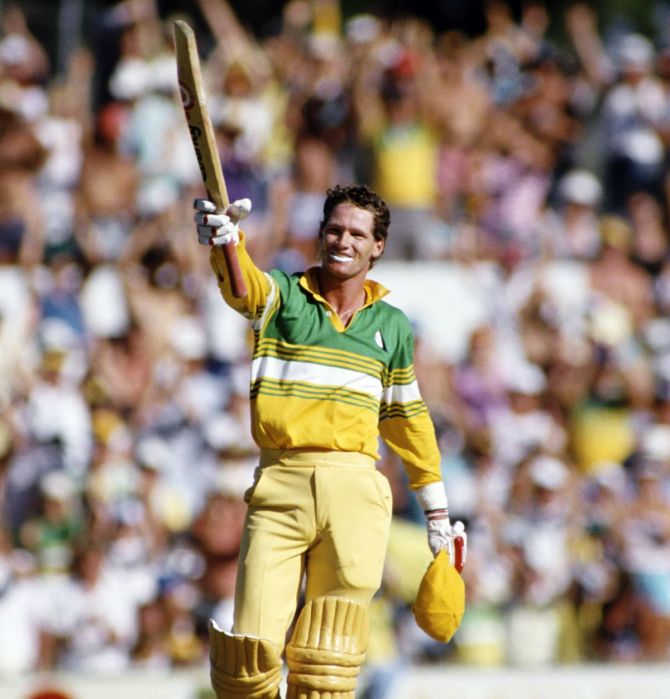
When you started out with Victoria, you were the 'brat' among a pack of seasoned veterans. What was the experience like? Was it particularly difficult, getting the seasoned vets to accept your presence in their midst?
My first game for Victoria was an experience! I made 36 not out against Western Australia which had Dennis Lillee, Terry Alderman and company.
It was also in a difficult period, when there was a clean-out, and some of the senior players didn't like their replacements.
As I walked back into the rooms, quite happy with my efforts, I did not realise what was about to happen.
Ray Bright, a senior player with a good international reputation, did not like me from the start.
He motioned to the team to raise their glasses and made a toast to the worst player he had ever seen put on a Victorian cap.
Well, I was completely guttered! What a statement to make to a debutant! It hurt me and the hurt stayed for a few years, and I used it as a motivational tool to prove to him and to the team that he was wrong.
Hopefully, my statistics have changed his mind!
India first woke up to your ability thanks to the tTied Test in Madras. Could you take us through your memories of that epochal knock of yours, the agonies and the ecstasies?
The Tied Test not only put me on the map, it was also the focal point in changing the future of Australian cricket.
Personally, it was my first Test after two years in obscurity; it was also a match that told me that I could play at this level.
As a player, the biggest question you ask yourself is whether you are good enough to be on the same ground as Gavaskar, Dev, Border and company.
Once you get over those negative thoughts, you're away.
The only disappointing thing about that Test was that I left my Man of the Match award behind in the rooms -- I'd dearly love to have that one here with me, at home.
Talking about prized trophies, did you know that the bat with which I scored all those runs in the Tied Test is eagerly sought after by collectors around the world? I believe the highest bid so far is US $110,000.
Your fight against dehydration in course of that knock remains an enduring image -- from what we hear, Allan Border minced no words when he was 'motivating' you to go on?
The Tied Test was played in the hottest conditions I have ever experienced!.
40degrees out there, every day, with unrelenting humidity at about 80 per cent.
I lost 8 kilos from that match alone, I received four bottles of saline through an intravenous drip.
I could not run at one stage -- Border and I took to walking our runs.
My tactics for the last part of my knock was to block three balls and then just muster up some energy and slog the next.
Luckily, it worked out.
Border did motivate me, in his own way -- when I was on 174, I was racked with pain, dehydration, felt like I had pins and needles in my hands, added with the fact that at times I could not stop myself from urinating in my trousers.
I mentioned to AB that I had had enough, and sure enough his reply was quick: 'Let's get a tough Australian out here then, if you can't handle it anymore.'
'Let's get a Queenslander!'
'Greg Ritchie can handle this!' So I told him what he could do with his tough bloody Queenslander, and batted on!
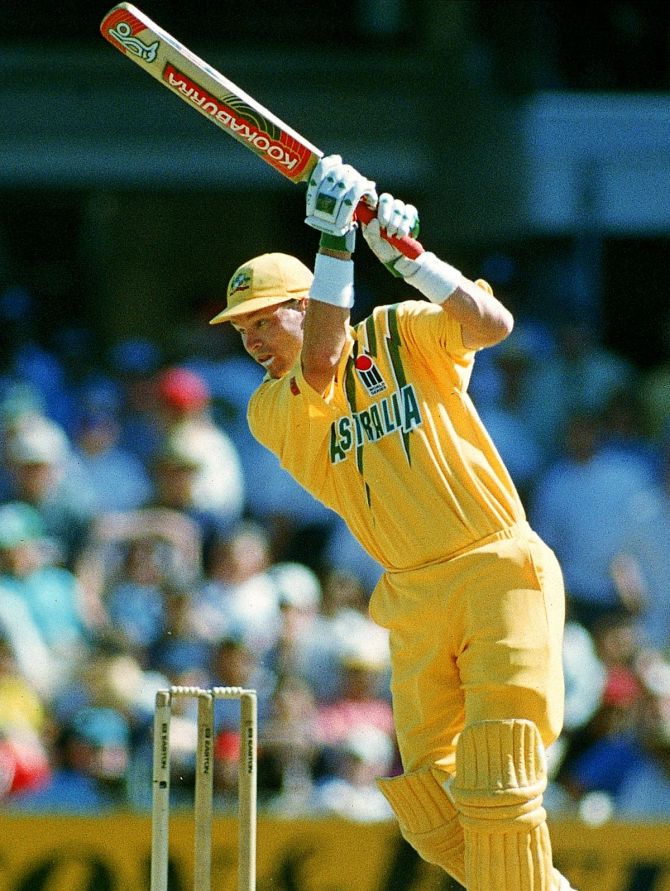
The 1987 World Cup saw you fit into the pivotal number three slot in the Australian team. What was the team's collective mood like, going into the tournament? At that point in time, Australia was rated around seventh or eighth among the contenders -- how did you, and the side, feel about that?
Australia was rated 7th in the World Cup in 1987.
Obviously, we had hoped to win this prestigious trophy, but realistically we really did not have a chance.
Our preparation was hard, we trained very hard at Madras for two weeks prior to the tournament.
This was perfect, to get used to the heat and conditions, and to develop a fantastic team spirit that carried us to a magnificent victory.
Everyone was rippling fit, where Bob Simpson worked heavily was on our fielding skills.
We formed team plans that we believed were very successful.
We had a theory that the team that makes the most singles will win 85% of the time.
Then, with whatever total we achieved, we had a great defensive bowling and fielding lineup, well supported by the fact we had bowlers who wanted to bowl at the death, like (Bruce) Reid, (Simon) O'Donnell and (Steve) Waugh.
They had a great attitude, and a great assortment of change up or slow deliveries.
Then psychologically, we would wake up in the very early hours of the morning after a match and make sure the opposition team was watching us at practise.
This would let everyone know how badly we wanted to win this one.
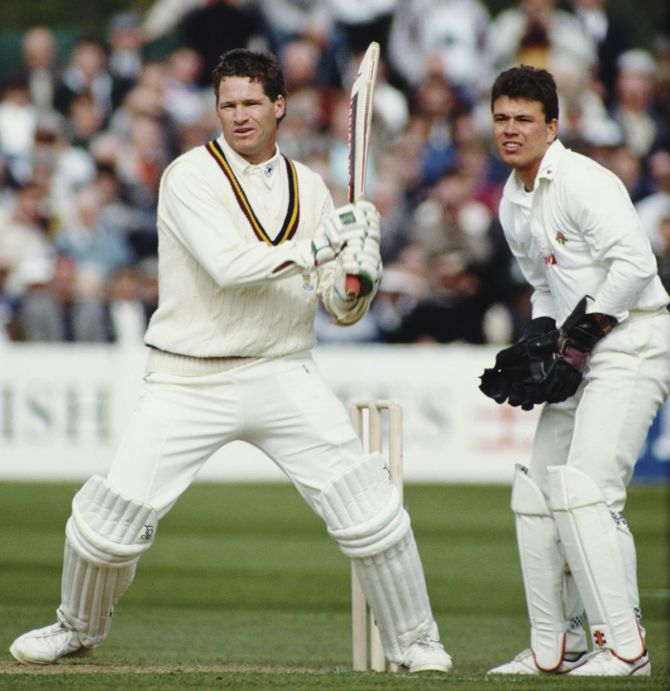
The early games of the 1987 campaign saw the Aussie side just about scraping through -- against India, against New Zealand, then the defeat at the hands of India in New Delhi... before finally making it to the semis for the first time since 1975. Could you take us through those games, your personal highs and lows?
Looking back at the World Cup in 1987, apart from our great efforts in the finals, the game that turned everything for us from an Australian point of view was the very first game against India in Madras.
It was such an important game to us psychologically, to beat India on their own turf, and it did not go without controversy.
I was facing Maninder Singh and I tried to hit him for a six over his head.
I hit it a bit thin and flat, directed towards Shastri.
He dived valiantly but fortunately for me, missed the catch and the ball appeared to just carry over the rope for what I thought was a six.
Ravi was not sure whether it was a six or not, neither was the umpire, Dicky Bird, who ended up signalling a four.
I got out shortly after and proceeded to Hanif Mohammed, the match referee, to question whether he can reverse the decision from a boundary to a six.
At the conclusion of our innings, Hanif Mohammed went to speak directly with umpire Bird himself.
Bird then proceeded to speak with Shastri and after a short conversation, the decision was reversed and two runs were added to our score.
Now, history shows that Australia won by 1 run, and if it wasn't for that decision who knows what would have happened!




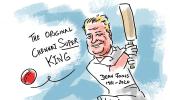







 © 2025
© 2025